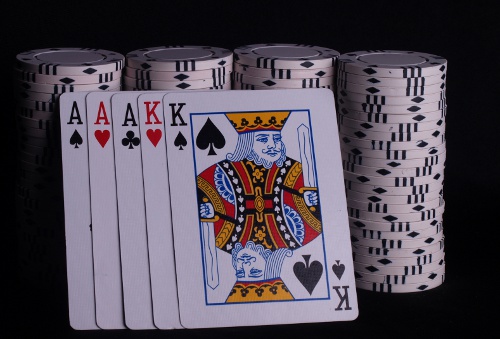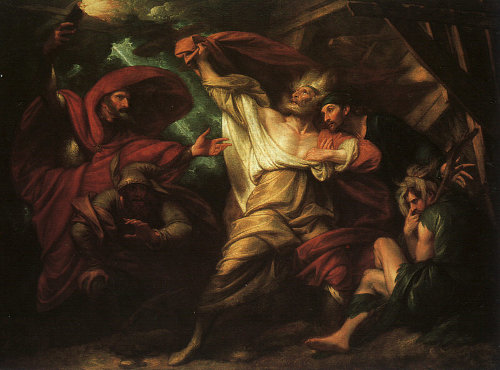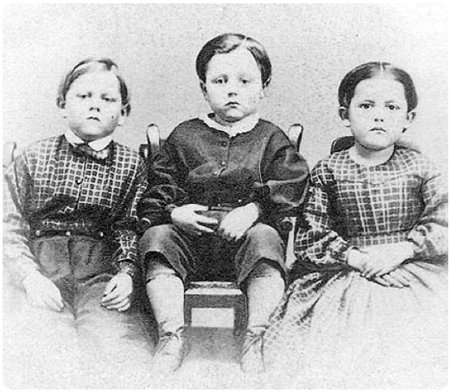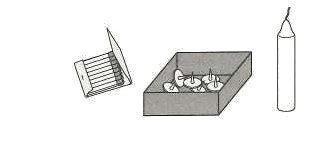
What is the best full house? Suppose you are playing poker and a genie offers to arrange the deal so that you receive the full house of your choice. What hand should you specify?

What is the best full house? Suppose you are playing poker and a genie offers to arrange the deal so that you receive the full house of your choice. What hand should you specify?
“A highbrow is a person educated beyond his intelligence.” — Brander Matthews
An old philosophical friend of mine was grown, from experience, very cautious in this particular, and carefully avoided any intimacy with [captious, overcritical] people. He had, like other philosophers, a thermometer to show him the heat of the weather, and a barometer to mark when it was likely to prove good or bad; but there being no instrument invented to discover, at first sight, this unpleasing disposition in a person, he, for that purpose, made use of his legs; one of which was remarkably handsome, the other, by some accident, crooked and deformed. If a stranger, at first interview, regarded his ugly leg more than his handsome one, he doubted him — if he spoke of it, and took no notice of the handsome leg, that was sufficient to determine my philosopher to have no farther acquaintance with him. Every body has not this two-legged instrument; but every one, with a little attention, may observe signs of that carping, fault-finding disposition, and take the same resolution of avoiding the acquaintance of those infected with it. I therefore advise those critical, querulous, discontented, unhappy people — if they wish to be respected and beloved by others, and happy in themselves, they should leave off looking at the ugly leg.
— Benjamin Franklin, 1780
The law in a certain village requires that any wife who can prove that her husband has been unfaithful must shoot him before sundown on the same day. Every wife reasons perfectly, and all the wives know this. Further, every wife knows instantly when another’s husband has been unfaithful but never whether her own is.
One day the mayor announces that there is at least one unfaithful husband in the village. In fact there are 40 unfaithful husbands, but the wives do not know this. What happens?

“Last night Mr. Creston Clarke played King Lear at the Tabor Grand. All through the five acts of that Shakespearean tragedy he played the King as though under momentary apprehension that someone else was about to play the Ace.” — Eugene Field, Denver Tribune, c. 1880
Awaiting the dawn sat three prisoners wary,
A trio of brigands named Tom, Dick and Mary.
Sunrise would signal the death knell of two;
Just one would survive, the question was who.
Young Mary sat thinking and finally spoke.
To the jailer she said, “You may think this a joke,
But it seems that my odds of surviving till tea
Are clearly enough just one out of three.
But one of my cohorts must certainly go,
Without question, that’s something I already know.
Telling the name of one who is lost
Can’t possibly help me. What could it cost?”
The shriveled old jailer himself was no dummy.
He thought, “But why not?” and pointed to Tommy.
“Now it’s just Dick and me!” Mary chortled with glee,
“One in two are my chances, and not one in three!”
Imagine the jailer’s chagrin, that old elf.
She’d tricked him. Or had she? Decide for yourself.
— Richard E. Bedient, “The Prisoner’s Paradox Revisited,” American Mathematical Monthly, March 1994

This item appeared in the Philadelphia Inquirer on Oct. 19, 1863:
Whose Father Was He?
After the battle of Gettysburg, a Union soldier was found in a secluded spot on the field, where, wounded, he had laid himself down to die. In his hands, tightly clasped, was an ambrotype containing the portraits of three small children, and upon this picture his eyes, set in death, rested. The last object upon which the dying father looked was the image of his children, and as he silently gazed upon them his soul passed away. How touching! how solemn! What pen can describe the emotions of this patriot-father as he gazed upon these children, so soon to be made orphans! Wounded and alone, the din of battle still sounding in his ears, he lies down to die. His last thoughts and prayers are for his family. He has finished his work on earth; his last battle has been fought; he has freely given his life to his country; and now, while his life’s blood is ebbing, he clasps in his hands the image of his children, and, commending them to the God of the fatherless, rests his last lingering look upon them.
When, after the battle, the dead were being buried, this soldier was thus found. The ambrotype was taken from his embrace, and since been sent to this city for recognition. Nothing else was found upon his person by which he might be identified. His grave has been marked, however, so that if by any means this ambrotype will lead to his recognition he can be disinterred. This picture is now in the possession of Dr. Bourns, No. 1104 Spring Garden [Street], of this city, who can be called upon or addressed in reference to it. The children, two boys and a girl, are, apparently, nine, seven and five years of age, the boys being respectively the oldest and youngest of the three. The youngest boy is sitting in a high chair, and on each side of him are his brother and sister. The eldest boy’s jacket is made from the same material as his sister’s dress. These are the most prominent features of the group. It is earnestly desired that all the papers in the country will draw attention to the discovery of this picture and its attendant circumstances, so that, if possible, the family of the dead hero may come into possession of it. Of what inestimable value it will be to these children, proving, as it does, that the last thoughts of their dying father was for them, and them only.
The description was reprinted in the American Presbyterian on Oct. 29, where it was read by Philinda Humiston of Portville, N.Y., who had not heard from her husband since Gettysburg. She identified the unknown soldier as Sgt. Amos Humiston of Company C, 154th New York Volunteers. His body was removed to the Gettysburg National Cemetery, and the outpouring of sympathy for his children led to the establishment of a Soldier’s Orphan’s Home in Gettysburg in 1866.
1234567891, 12345678901234567891, and 1234567891234567891234567891 are prime.
So are
19
197
1979
19793
197933
1979339
19793393 and
197933933.
And so are
742950290870000078092059247
742950290871010178092059247
742950290872020278092059247
742950290873030378092059247
742950290874040478092059247
742950290875050578092059247
742950290876060678092059247
742950290877070778092059247
742950290878080878092059247 and
742950290879090978092059247.
If the nth term of the Fibonacci series is prime, then n also is prime (where n > 4). For example, the 17th term, 1597, is prime, and 17 is prime.
05/27/2017 UPDATE: Further to the first series, 1979339333 is also prime! (Thanks, Alon.)

Given a book of matches, a box of thumbtacks, and a candle, how can you fix the candle to the wall so that its wax won’t drip onto the table below?